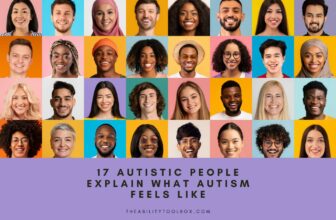
In the autumn of 2022, with the help of a friend, I produced a guide (in the form of a PowerPoint hand-out) called “A Guide to My Autistic Self.” This was aimed at my parents as a means of helping them understand me and my autism better.
I have noticed some subtle changes in how my parents respond to me and my autism since sharing that guide with them, but we haven’t explicitly spoken about the specifics of what was highlighted.
I am using some of what I used in that guide here. I am speaking from my perspective, but I believe that these elements will be helpful to a lot of other autistic people. Here are 10 things parents should understand about their autistic child.
1. Autism is not something you “grow out of” after childhood.
It’s not a disease or a character flaw. Needless to say, it’s not something to be cured either.
2. Autism is not bad behavior.
When I’m overwhelmed, I’m not intending to be disrespectful. Sensory overload is an automatic, involuntary response. With space and understanding, I can go some way toward recovering from it.
3. Our autistic brains are wired differently.
Think of it as a different operating system (Android vs iOS for example). The way my brain is wired means I can struggle to cope with things that others might be fine with. Sometimes this can be misinterpreted as immaturity, being anti-social, or over-exaggerating, but these things have a real impact on me and those around me.
4. Being given clear instructions is helpful.
Sometimes I might misinterpret or misunderstand what’s being said. It’s helpful if the other person ensures I’ve understood, I’m given the freedom to ask questions, and they give me time and space to process what they’ve said.
5. I will need to be given time and space if I’m upset.
It can be hard for me to communicate what I’m upset about. I’ll need space to process my emotions and ideally not to be asked too many questions. Empathy from the other person is always helpful, even if they won’t understand.
6. Telling me to calm down or not get angry is not helpful.
Keep in mind that telling me not to feel something doesn’t make the feeling go away. Emotions are like a wave. They come and they go and fighting them is a waste of energy. Instead, I can only try to regulate them, which may look different than in other people.
7. Social situations can be challenging for kids and adults on the autism spectrum.
Eye contact can be difficult, but it doesn’t mean I’m not listening. If I’m uncomfortable speaking, being forced into it will do more harm than good.
8. Talking to my friends about personal matters is healthy.
It doesn’t mean I am keeping secrets. My friendships are important to me.
9. My boundaries are important.
Autistic people have boundaries that should be respected. This includes my privacy (e.g., not reading my mail), the right to make my own choices (e.g., jobs and relationships), and physical contact (e.g., no hugs without permission).
10. I might take longer to reach certain life milestones than society expects.
It doesn’t mean that I’m falling behind in achievements. Comparing me to my neurotypical counterparts is unhelpful.
These are just a few of the things I want my parents to understand. I hope others feel comfortable enough to share this list with their parents.
More Resources to Help You Understand Your Child on the Autism Spectrum
It's important for parents to listen to autistic adults when they talk about their childhoods because their child is probably having similar experiences. These books give you a variety of perspectives so you can truly support your child.
What do you want your parents to understand about your autism?
Share your experiences with our community in the comments below.
More Autism & Neurodiversity Resources in The Ability Toolbox
- Calm Strips: A Complete Guide to Fidget Stickers for Anxiety, Autism, & ADHD
- The Ultimate Executive Dysfunction Self-Help Guide: Coping Skills to Help You Thrive
- All About Autism Masking and Camouflaging
- Sensory Lights for Autism and ADHD: A Guide
- Awesome Autism Books Written by Actually Autistic Authors













